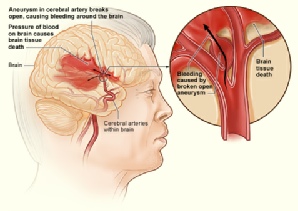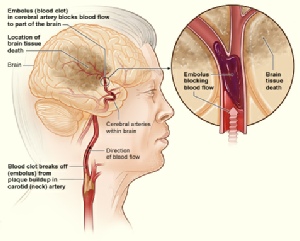DR MILES DALBY
MBBS BSc MD FRCP FESC
CONDITIONS
Stroke and TIA
Stroke is an important condition because it can cause disabling problems and furthermore can sometimes be prevented with appropriate treatment. It is often manifest as weakness, particularly when this affects one side of the body or difficulty speaking. A stroke that resolves completely within 24 hours is known as a transient ischaemic attack (TIA)
Strokes are caused by damage to the brain, usually due to starvation of blood supply (iscahemia). Less commonly strokes are caused by bleeding affecting the brain(haemorrhage).
Ischaemic strokes are often caused by a blood clot travelling to the brain (embolic). This may be due to atherosclerosis of the aorta (main artery in the chest) or carotid arterties (arteries in the neck), but one of the most common and important causes of embolic stroke is atrial fibrillation (AF). Stroke risk in AF can be significantly reduced by drug treatment to thin the blood (anticoagulation) and sometimes by a procedure called left atrial appendage occlusion. Less frequently, strokes may be caused by a ‘paradoxical embolus’ passing through a small hole in the heart between the atria ‘PFO’. In such cases it may be appropriate to suggest closing the PFO, usually through a minimally invasive catheter technique.
For acute ischaemic stroke treatment may include emergency administration of ‘clot busting’ (thrombolytic) drugs to help restore brain function or trans catheter ’thrombectomy’ techniques to remove the blood clot.
Narrowing of the carotid arteries supplying blood to the brain may need treatment with drugs, an operation called carotid endarterectomy or carotid senting.


National Heart Lung and Blood Institute
Haemorrhagic (bleeding) strokes are often managed with drug therapy however occasionally an operation will be needed to relieve pressure form the blood onteh brain, sometimes as an emergency.
Anyone who thinks they or anybody else may be having a stroke should seek urgent medical attention from the emergency services (by dialling 999 in the UK).
Strokes are usually managed by neurologists with tests including blood tests, a CT and or MRI brain scan, ECG, holter monitor to look for evidence of atria fibrillation, echocardiogram possibly with a bubble study to look for a PFO and carotid artery ultrasound, followed by appropriate treatment recommendations. For acute ischaemic stroke treatment may include emergency administration of ‘clot busting’ (thrombolytic) drugs to help restore brain function. Such treatment is very time dependant and requires early recognition of stroke.
From a cardiovascular perspective, the risk of having a stroke can be reduced with appropriate screening and subsequent management.
Dr Dalby will discuss these tests, their implications and any subsequent tests, treatment or follow up with you so that you may reach a mutually agreeable management plan.